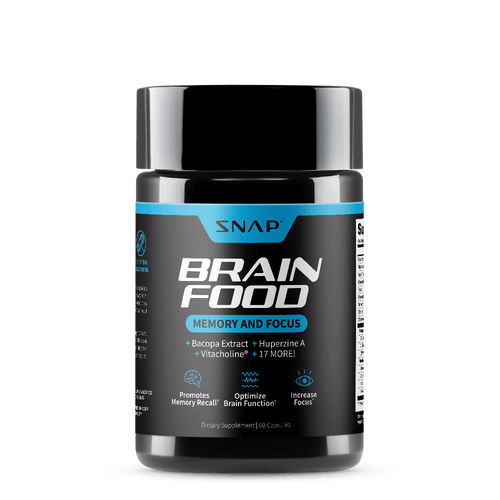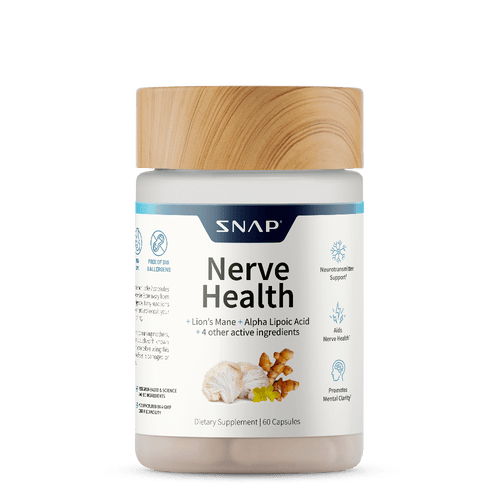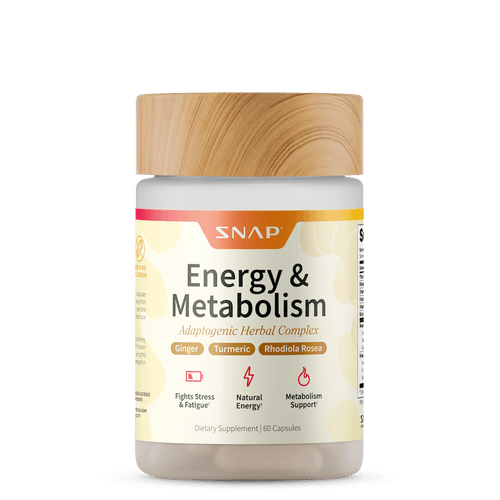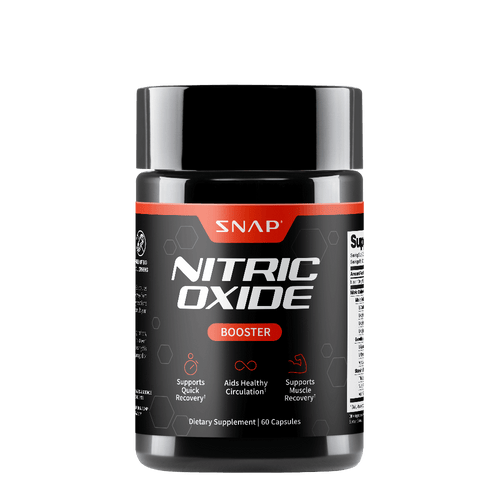Boosting your brainpower naturally can be both exciting and rewarding. Many scientifically researched herbs promise to improve cognitive function and may be just what you need. Herbs like Ginkgo biloba, Bacopa monnieri, and Rhodiola rosea are known for their potential benefits, such as improving memory and mental clarity.
Here at Snap Supplements, we offer a unique approach by blending modern science with natural ingredients. This combination ensures you get the most out of superfoods, herbs, and minerals. Our trusted, high-quality products focus on optimizing health in an easy and effective way.
$38.00

Nourriture pour le cerveau
Understanding Cognitive Function
Cognitive function refers to the mental processes that involve knowledge, reasoning, memory, attention, and language skills. These functions are essential for daily activities and decision-making. Proper cognitive function helps in solving problems, learning new skills, and processing information effectively.
Key Components of Cognitive Function
-
Memory: Storing and retrieving information.
-
Attention: Focusing on tasks and filtering distractions.
-
Language Skills: Understanding and using language.
-
Reasoning and Problem-Solving: Making decisions based on available information.
Numerous factors can affect cognitive function, including genetics, lifestyle, and environmental influences. Stress, poor nutrition, and lack of sleep are common challenges. Enhancing cognitive function can improve your daily performance and quality of life.
We focus on using clinically researched herbs to support cognitive health. These herbs and minerals are combined with modern science to help you achieve your best mental state.
Lifestyle Tips for Enhanced Cognitive Function
-
Balanced Diet: Include a variety of fruits, vegetables, and whole grains.
-
Regular Exercise: Boosts blood flow to the brain.
-
Adequate Sleep: Important for memory consolidation.
-
Stress Management: Practice mindfulness or yoga.
These steps can help maintain and even improve cognitive function naturally, supporting your overall mental wellness throughout life.
$42.00

Santé nerveuse
$56.00
Foundations of Herbal Medicine
Herbal medicine has been used for centuries across different cultures. Modern science now backs some traditional herbs with research. You’ll find that today's herbal remedies can complement or sometimes provide alternatives to pharmaceuticals.
History and Traditional Use
Herbal medicine dates back thousands of years. Ancient cultures, such as the Egyptians and Chinese, relied on plants for healing. They knew which plants to use for specific ailments and passed down this knowledge through generations.
Each society had unique methods and plants. For example, Native Americans used herbs like echinacea for immune support. Many of these practices have been confirmed by current research, highlighting the ongoing relevance of traditional herbal knowledge.
Modern Phytotherapy
Today, phytotherapy uses scientific methods to study plant-based treatments. This bridges ancient wisdom with modern research. It examines how herbs affect the body and can support health.
Herbs vs. Pharmaceuticals
Herbs and pharmaceuticals serve different purposes. Pharmaceuticals are often fast-acting and target specific conditions. They are synthesized in labs and may have side effects.
While pharmaceuticals are crucial for acute care, herbs can be a choice for ongoing wellness. The choice between herbs and drugs can depend on personal preference and health needs, emphasizing the role of knowledge in health decisions.
Evidence-Based Herbal Nootropics
Herbs like Ginkgo Biloba, Panax Ginseng, Bacopa Monnieri, and Rhodiola Rosea are clinically studied for cognitive improvement. These natural supplements are known to aid memory, focus, and overall brain health by promoting better circulation and balancing stress responses.
Ginkgo Biloba
Ginkgo Biloba is an ancient tree species used in traditional medicine. It is praised for its role in improving blood flow to the brain. This increased circulation may enhance memory, attention, and clarity in thinking.
Some studies suggest regular use of Ginkgo Biloba can help reduce symptoms of cognitive decline in older adults. It's often recommended for those experiencing mild memory issues.
Panax Ginseng
Panax Ginseng, also known as Korean Ginseng, is renowned for its ability to help the body adapt to stress. It is believed to improve mental alertness and cognitive performance. Studies show that Panax Ginseng may enhance memory, focus, and mood.
This herb can be especially beneficial for people experiencing mental fatigue or burnout. It is incorporated into various wellness routines for its potential to support overall brain health.
$35.00

Énergie et métabolisme
Bacopa Monnieri
Bacopa Monnieri is often used in herbal supplements targeting cognitive health. Known for its antioxidant properties, it supports brain function by reducing oxidative stress. This may allow neurons to function more effectively.
Research indicates that Bacopa Monnieri improves memory storage and recall, particularly in older adults. Consistent use might help with learning new information and maintaining mental clarity.
Rhodiola Rosea
Rhodiola Rosea is an adaptogen, aiding the body's response to stress. It is known for boosting mental energy and decreasing fatigue. Many find it beneficial for enhancing focus and mental performance, especially in stressful situations.
Research shows that Rhodiola Rosea may improve mood and reduce anxiety, which can affect concentration and productivity. It is a popular choice for those seeking a natural way to support cognitive function and manage stress.
{recommended_product_5}
Herbs for Neuroprotection
You can support brain health with certain herbs known for their neuroprotective properties. These herbs help protect against cell damage, help soothe inflammatory symptoms, and support cognitive function.
Curcumin
Curcumin is found in turmeric and is known for its powerful antioxidant and anti-inflammatory properties. These qualities may help in protecting the brain from oxidative stress and inflammation, which are factors in neurodegenerative diseases.
Studies suggest that curcumin can aid in the reduction of plaques found in Alzheimer's disease, potentially improving memory and overall brain function. You can find curcumin in various supplement forms crafted to support cognitive health.
Ashwagandha
Ashwagandha is a traditional herb used in Ayurvedic medicine, known for its ability to reduce stress and anxiety. It may also have neuroprotective benefits by reducing inflammation and oxidative stress, which are harmful to neurons.
Research indicates that ashwagandha improves memory and cognitive functions. It supports the growth of nerve cells and regenerates axons and dendrites, contributing to enhanced memory retention and learning abilities.
Green Tea Extract
Green tea extract contains compounds called catechins, which have antioxidant properties that protect brain cells from damage. The most studied catechin in green tea is epigallocatechin gallate (EGCG), known for enhancing memory and attention.
Regular intake of green tea extract may support mental alertness and reduce the risk of cognitive decline. It helps by reducing inflammation, improving blood flow to the brain, and protecting neurons. Green tea extract is available in various formats, making it easy to incorporate into your daily routine for cognitive support.
Mechanisms of Action
Understanding how clinically researched herbs work to boost cognitive function is essential. These herbs often provide benefits through their antioxidant properties, modulation of neurotransmitters, and enhancement of neuroplasticity.
Antioxidant Properties
Antioxidants protect your brain by neutralizing harmful molecules called free radicals. These free radicals can damage cells and lead to inflammation, which may impair cognitive function. Herbs like Ginkgo biloba and green tea contain powerful antioxidants that can reduce oxidative stress. This protection helps maintain clear thinking and memory retention. Antioxidants also support overall brain health by preventing the decline associated with aging.
Neurotransmitter Modulation
Neurotransmitters are chemical messengers in your brain that influence mood, focus, and memory. Herbs like St. John's Wort and Bacopa monnieri can help regulate these neurotransmitters. For example, they may increase the levels of serotonin or dopamine, which are associated with positive mood and alertness.
Adjusting neurotransmitter levels can enhance cognitive performance by improving attention and reducing mental fatigue.
Neuroplasticity Enhancement
Neuroplasticity is your brain's ability to reorganize itself by forming new neural connections. This feature is crucial for learning and adapting to new information. Herbal supplements such as lion's mane mushroom have been shown to stimulate brain-derived neurotrophic factor (BDNF), a protein that supports neuroplasticity.
Enhanced neuroplasticity can lead to improved learning abilities and faster recovery from brain injuries. By promoting the growth of new neurons and boosting BDNF levels, these herbs offer a natural way to enhance cognitive function.
$39.00

Booster d'oxyde nitrique (60 ct)
Clinical Research and Efficacy
When exploring clinically researched herbs for cognitive function, it is vital to understand how these studies are designed and analyzed. Studies often use specific methods to ensure results are accurate, while reviews gather data to provide comprehensive insights.
Study Design Considerations
Study design plays a crucial role in understanding the effectiveness of herbs. Randomized controlled trials (RCTs) are commonly used because they minimize bias. In these studies, participants are randomly assigned to either the treatment group or a control group. This helps in obtaining reliable results.
Proper blinding techniques are also important. Single-blind or double-blind studies help ensure that neither participants nor researchers know which group receives the treatment, reducing bias. The use of placebos ensures that the effects observed are due to the herb and not other factors.
Sample size and duration of the study are also significant. Larger sample sizes increase confidence in the results, and longer studies might reveal more about long-term effects. Researchers consider all these factors when reviewing the efficacy of herbs used for cognitive enhancement.
Composite Cognitive Scores
To measure how herbs affect the brain, researchers often use composite cognitive scores. These scores might include tests for memory, attention, and problem-solving abilities.
Researchers collect data through various tests, including verbal memory tests and reaction time assessments. By looking at these areas, researchers can form a comprehensive understanding of cognitive impact.
Standardized tests may be utilized to obtain comparable results across different groups and studies. Consistent methods help ensure that the improvements noted are a direct result of the herbs used.
Meta-Analyses and Systematic Reviews
Meta-analyses and systematic reviews compile data from multiple studies to offer a broader understanding of herbal efficacy. By combining results, researchers can identify trends and strengthen evidence that supports cognitive benefits.
These methods involve thorough data evaluation, ensuring that only high-quality studies contribute to the analysis. Statistical tools may be utilized to analyze data, confirming results' reliability.
Researchers look for patterns in findings. Wide-reaching reviews provide valuable insights, offering a clear picture of how effective an herb truly is.
Safety and Side Effects
When using herbs for cognitive function, it’s important to consider safety and possible side effects. Factors like contraindications, interactions with medications, and long-term use should be part of your decision-making process.
Contraindications
Some herbs might not be suitable for everyone. For instance, pregnant or nursing women should be cautious, as certain herbs can affect hormones or pregnancy. People with specific health conditions, such as autoimmune diseases or hormonal imbalances, must seek medical advice before use.
Using herbs requires mindfulness. Conditions like high blood pressure or bleeding disorders might get worse with certain herbs. It’s critical to assess if any underlying health issues exist.
Interactions With Medications
Herbs can interact with medications, altering their effectiveness or causing side effects. For example, herbs like Ginkgo biloba might thin blood. Taking it alongside blood thinners may increase bleeding risks.
Consult a healthcare provider about combining herbs with medications. Substances like antidepressants, heart medications, or blood pressure pills can have complex interactions with herbal supplements.
Long-Term Safety
Consuming herbs for extended periods can have various effects. Some can accumulate in your body, leading to toxicity or unwanted effects. For instance, St. John's Wort, if overused, can affect mood stability and liver health.
Regular monitoring by your healthcare provider is advised when using herbs long-term. They can recommend necessary precautions or alternative treatments if side effects arise.
Herbs should be used with awareness of their impact over time. Be informed and careful when considering herbal supplements for long-term cognitive support.
Future Directions in Herbal Cognitive Enhancers
Exploring how herbal cognitive enhancers can be tailored to individual needs and discovering new compounds offers exciting potential for brain health. Understanding genetic predispositions and novel extracts can significantly impact the effectiveness of these natural remedies.
Genetic Predispositions
Your genetic makeup influences how you respond to herbal cognitive enhancers. Scientists are researching how specific genes impact the effectiveness of certain plants and herbs in boosting brain function. This knowledge can lead to personalized supplements tailored to your unique genetic profile.
Identifying which herbs work best for different individuals can revolutionize how you enhance cognitive health.
Novel Extracts and Compounds
Researchers are constantly seeking new herbal extracts and compounds with potential cognitive benefits. Discovering and analyzing these could lead to the development of more effective brain health supplements. This includes exploring lesser-known herbs and their active ingredients.
Frequently Asked Questions
When considering herbs for cognitive support, it's important to understand how they interact with brain health, focus, and memory. Some herbs are noted for their ability to promote healthy cognition, while others support overall brain and nervous system health. Below, you'll find specific questions and answers regarding various herbs and their effects on cognitive function.
What are the best herbs to promote healthy cognition and focus?
Herbs like ginkgo biloba and bacopa monnieri are known for enhancing memory and focus. Ginkgo biloba may increase blood flow to the brain, and bacopa monnieri is believed to improve cognitive processing time.
Which herbs are known to help with brain cell regeneration?
Gotu kola and ashwagandha are believed to support brain health. Gotu kola may aid in brain cell regeneration, while ashwagandha is thought to help protect brain cells from damage and promote overall brain health.
What natural herbs assist in enhancing brain power?
Turmeric, with its active ingredient curcumin, is noted for brain-enhancing properties. It may help soothe inflammatory symptoms and boost antioxidant levels, which are important for brain health.
How can cognitive function be naturally improved?
Nutrition, regular exercise, and good sleep are key to naturally improving cognitive function. Including natural supplements like the ones from Snap Supplements in your routine may also be beneficial.
Which herbs are beneficial for boosting focus and concentration?
Rhodiola rosea and ginseng can aid in boosting focus and concentration. Rhodiola may reduce mental fatigue, while ginseng is often used to improve concentration and mental performance.
What are the top herbs for supporting brain and nervous system health?
Lion's mane is gaining recognition for its potential to protect nerve cells. It's known for supporting both the brain and nervous system. Additionally, Snap Supplements can provide blends that support overall cognitive function.